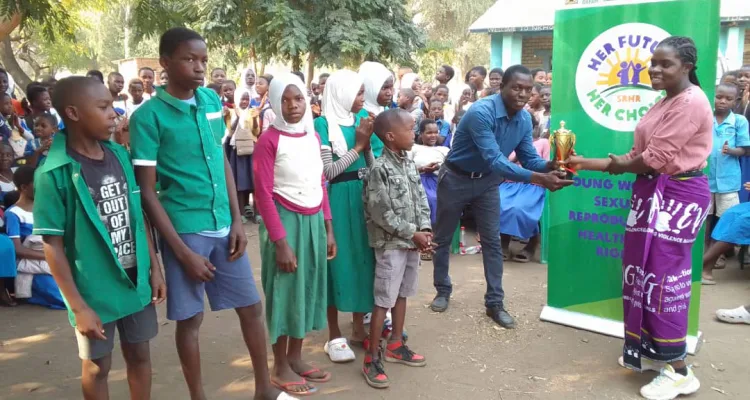
Education stakeholders in Balaka District say exposing learners to age-appropriate information about Sexual Reproductive and Health Rights (SRHR) as well as Gender Violence (GBV) is crucial for their physical, emotional, and psychological well-being.
Without comprehensive education on the vices of early sexual activities, learners may engage in risky behaviours, leading to unintended pregnancies, early marriages, and Sexually Transmitted Infections (STIs).
To impart learners with SRH knowledge as well as GBV and to help them make informed decisions about their lives, the Centre for Alternatives for Victimized Women and Children (Cavwoc) has intensified awareness meetings with primary school learners drawn from Nkhonde and Ulongwe zones in Balaka District.
Through the Global Affairs of Canada (GAC) funded ‘Her Future Her Choice’ project, the organization has since 2019 reached out to thousands of adolescents with SRHR information as well as GBV-related information among other interventions.
Speaking on Wednesday at the end of a two-day-long inter-schools quiz competition, Primary Education Advisor (PEA) responsible for Nkhonde zone, Samuel Thanganyika, lamented that lack of comprehensive SRH education among learners is a major setback as it drives learners out of school due to teen pregnancies and early marriages.
He believes that keeping learners informed on various issues surrounding SRH and GBV is a catalyst in shaping their future.
“Issues of teenage pregnancies, early marriages, and gender-based violence are common in our societies. We cannot run away from this fact.
“It is therefore imperative to break the chain of silence and keep the learners informed on such issues so that we help them to run away from certain dangerous habits that can endanger their lives,” narrated Thanganyika.
He hailed the project for helping raise education standards in the Nkhonde zone, arguing, that the school drop-out rate, especially among girls has dropped.
“The project has helped girls to remain in school until they finish their primary school cycle and graduate to secondary level. It’s also interesting that some girls have been re-admitted back to school from early marriages,” Thanganyika said.
Echoing his remarks, zonal PEA for Ulongwe, Wiziloni Gonani Charle said it is important for learners to be informed on issues of SRH and GBV, arguing, that sexual activities are taking place within the societies where these learners live, hence a need to protect them from the dangers that come along with such treacherous acts.
“It’s better to let the learners know about the dangers of indulging in early sexual activities than to let them face the consequences because of the knowledge gap,” said Charle.
The inter-school quiz activities are just some of the interventions being carried out by Cavwoc in a bid to keep the adolescents informed on SRH and GBV.
One of the participants in the quiz competition, Shakira Yahaya, 18, a standard 8 learner at Nkhonde Primary School said the competitions have helped her to understand various information about SRH and how to report cases of GBV.
‘Her Future Her Choice’ project coordinator at Cavwoc, Asante Mbisa, expressed satisfaction with the improvement in knowledge levels as displayed by the learners to SRH and GBV.
“It’s impressive to note that since the inception of the project in 2019, levels of understanding have remarkably improved as they are now able to know and understand about their sexuality, GBV, and reporting mechanisms,” said Mbisa.
The project is being carried out by a consortium of non-governmental organizations which include; Cavwoc, Family Planning Association of Malawi (Fpam), and Point of Progress with technical support from Oxfam in Malawi.
The project seeks to strengthen and empower adolescent girls and young women to secure their sexual reproductive health and rights in target regions of Ethiopia, Malawi, Mozambique, Zambia, and Canada.
In Malawi, young people grapple with several challenges about sexual reproductive health and rights. Some of the prevalent challenges include; limited access to SRH education and services, limited access to information, and limited access to contraceptives and information on usage among others.
The project is being implemented in Lilongwe and Balaka districts. In Lilongwe, the project has a catchment area of Traditional Authorities Malili and Chimutu while in Balaka, the project is being carried out in Traditional Authorities Amidu and Kalembo.
Oxfam collaborates with the Ministry of Health and other Government Ministries, Departments and Agencies, Parliamentary committees and caucuses, civil society organizations, and the Media in delivering project interventions.














